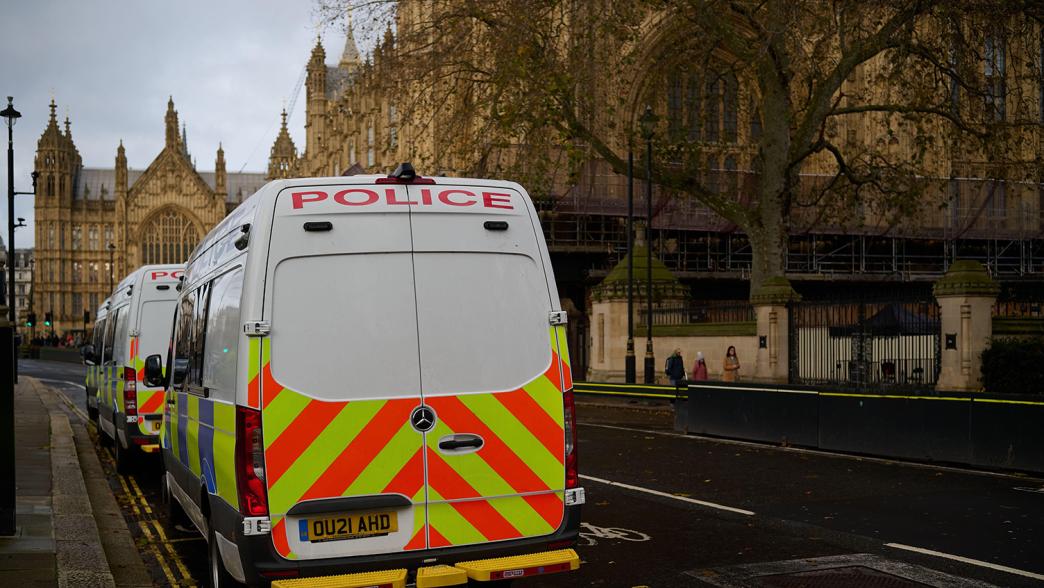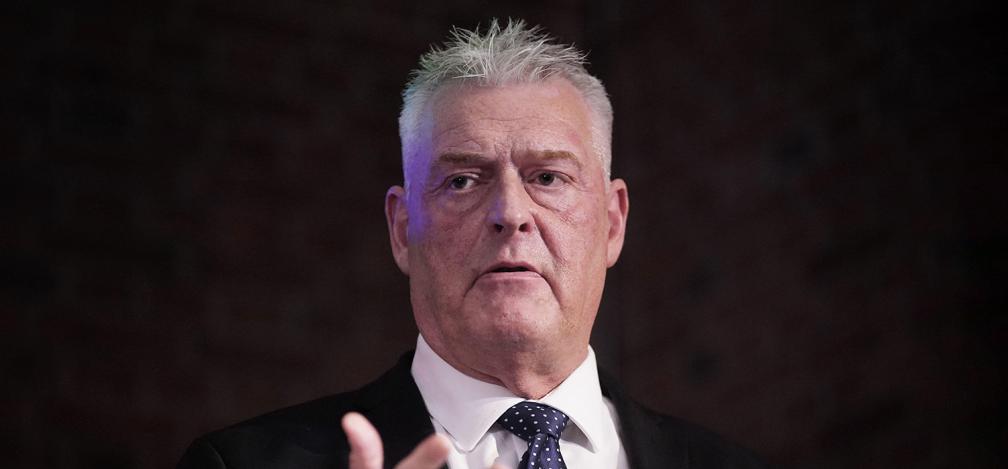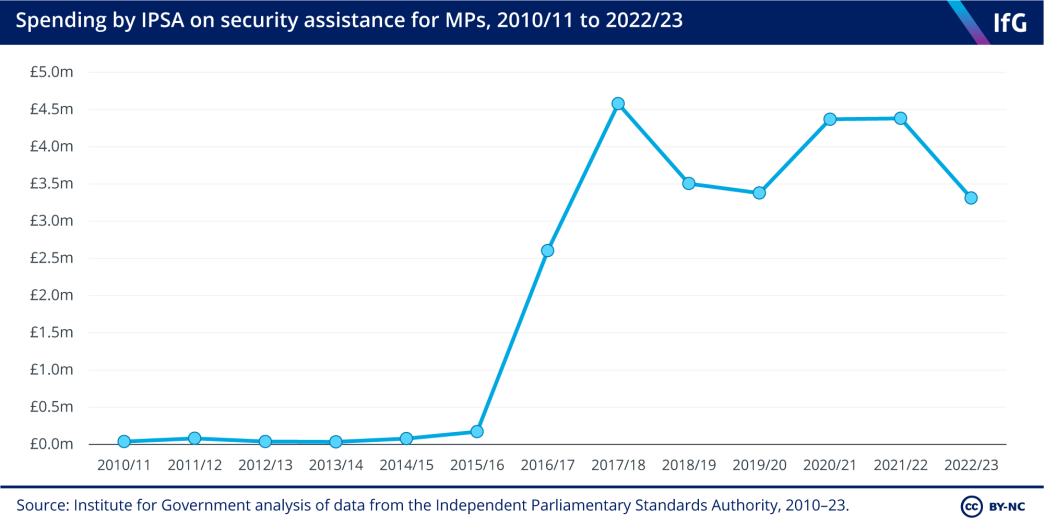MPs' security
Increasing levels of anti-Semitism and Islamophobia have seen a rise in threats made to MPs. So what security do they receive and how is this funded?

To ensure that they can undertake their duties safely, MPs receive various kinds of support and funding for security. This explainer sets out the security assistance that MPs can receive and how this is funded.
What is the scale of security threats facing MPs?
Data on security threats is not always easy to compile. Multiple police forces may be involved, for example, or MPs may choose to report things in different ways. But the data that exists, as well as anecdotal evidence from MPs and staffers, shows that MPs of all political parties face real and significant threats to their security, and indicates that the volume of these threats has increased over the last decade.
The Metropolitan Police stated in 2019 that there had been “a clearly increased volume” of incidents affecting MPs. 13 Oral evidence to the Joint Committee on Human Rights, 8 May 2019, data.parliament.uk/ writtenevidence/committeeevidence.svc/evidencedocument/human-rights-committee/democracy-freespeech-and-freedom-of-association/oral/101929.pdf. They published data showing that MPs reported 151 alleged crimes to the police in 2017, rising to 342 in 2018: a 126% increase. 14 Oral evidence to the Joint Committee on Human Rights, 8 May 2019, data.parliament.uk/ writtenevidence/committeeevidence.svc/evidencedocument/human-rights-committee/democracy-freespeech-and-freedom-of-association/oral/101929.pdf. Similarly, a 2019 BBC survey of MPs found that over 60% of those who responded had contacted the police about threats received in the previous year. 15 L. Manning and P. Kemp, ‘MPs describe threats, abuse and safety fears,’ BBC News, 6 August 2019, www.bbc. co.uk/news/uk-politics-49247808. In its 2022-23 annual report, the House of Commons stated that “the threat to MPs has increased and remains substantial.” 16 House of Commons Annual Report and Accounts, 2022-23, www.parliament.uk/globalassets/documents/commons-expenditure/admin-annual-accounts/administration_annual_report_and_accounts_2022_23-accessible-v2.pd…
In recent years, there have been multiple instances of people prosecuted and, in some cases jailed, for making threats to MPs across the political spectrum. These have included death and rape threats sent to MPs via email and social media, as well as plots to murder MPs. Many MPs have publicly spoken about their experiences and the security measures they have had to take, which have included installing panic rooms; carrying panic alarms; changing their routes to and from their office; and installing bomb-proof letterboxes.
Police data suggests that female MPs and those from minority backgrounds are disproportionately targeted. At the 2019 election, some MPs who chose to stand down from the Commons cited the scale of threats they faced, as have some MPs who have announced they will not stand at the next election.
Who is responsible for MPs’ security?
MPs’ roles are varied and are not confined to one location— they work both on the parliamentary estate and in their constituencies. There are therefore multiple organisations with responsibility for their security.
Parliamentary Estate
Inside parliament, the Parliamentary Security Department (PSD) has responsibility for the strategy, planning, and overall delivery of security. It works across the Commons and Lords. The PSD also works with the Metropolitan Police, who provide officers to police parliament. The Metropolitan Police also have a dedicated team based in the Palace of Westminster - the parliamentary Liaison and Investigation Team (PLaIT) - which liaises with other police forces across the country and the PSD.
Constituencies
Responsibility for MPs’ security outside of the parliamentary estate lies with the local police force, who liaise with the Met, and the PSD. Every MP is given a named contact in their local police force who takes the lead on security issues.
Islamophobia and anti-Semitism rows highlight the power of parties over political discourse
The Lee Anderson furore is unlikely to be the last of its kind in a general election year, writes Dr Hannah White.
Read the comment
What security assistance can MPs receive and how is it funded?
Security assistance for MPs is broadly divided into two categories: ‘routine’ security (measures that are advised for all MPs) and ‘enhanced’ or ‘further’ security measures (which may be recommended by the police to some MPs depending on their individual circumstances).
Until April 2023, both forms of security measures were funded by the Independent Parliamentary Standards Authority (IPSA), which sets and regulates the payment of MPs’ pay, pensions and business costs. Both routine and further security measures were funded via IPSA’s security assistance budget.
Following changes to how MPs’ security is managed, since April 2023 routine security measures have been funded via the accommodation and office cost expenses that MPs can claim from IPSA, while further security measures are paid for by the House of Commons.
How much does security assistance for MPs cost?
The best data series on the cost of MPs’ security is from IPSA’s security assistance budget, which existed until April 2023 and paid for routine and further security measures.
In 2022-23, the last financial year in which all security assistance was paid for out of IPSA’s security assistance budget, spending was £3.3m. This was slightly lower than in the two previous financial years (£4.4m in both 2021-22 and 2020-21), but still over 80 times as high as in 2010/11.

Since early 2016, a number of factors have combined to significantly increase the cost of MPs’ security. At the beginning of 2016, and following threats made to MPs in the wake of parliamentary debates over British military action in Syria, the National Police Chiefs’ Council (NPCC) recommended that all MPs adopt a package of security measures.
As MPs began to adopt these measures, several tragic events highlighted the very real threats they faced: the murder of Jo Cox MP in June 2016, then in March 2017 a terrorist attack killed six people outside the Houses of Parliament, including PC Keith Palmer, a police officer on duty. In light of these events, and earlier recommendations made by the NPCC on MPs’ security, spending increased significantly. In the 2017/18 financial year, a total of £4.2m was spent on providing additional security assistance to MPs. This was a more than 60% increase on the £2.6m spent in 2016/17 – and over £4m above the £171,000 spent in 2015/16.
Although costs have varied since 2015/16, they have remained far higher than before, highlighting the much greater concerns about security.
What funding did the government announce in February 2024?
On 28 February 2024, the government announced a £31m package of measures designed to boost MPs’ security as well as protect democratic processes more broadly.
The government has said that this money will be used to ensure that all elected representatives (and candidates seeking election) will have a named contact in the police to discuss security matters with, as well as expand some of the additional security support available to MPs. Some of this money—although it is not known exactly how much—will be spent through parliament.
- Administration
- Sunak government
- Legislature
- House of Commons
- Public figures
- Rishi Sunak
- Publisher
- Institute for Government